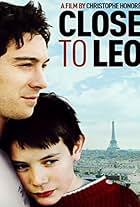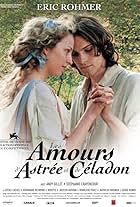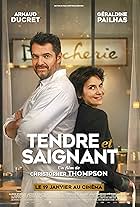After a love affair ends badly, a young Parisian named Paul (Romain Duris) sinks into the same kind of deep depression that led his sister to kill herself. He moves back home with his father... Read allAfter a love affair ends badly, a young Parisian named Paul (Romain Duris) sinks into the same kind of deep depression that led his sister to kill herself. He moves back home with his father (Guy Marchand) and aimless brother Jonathan (Louis Garrel) but refuses to get out of bed.... Read allAfter a love affair ends badly, a young Parisian named Paul (Romain Duris) sinks into the same kind of deep depression that led his sister to kill herself. He moves back home with his father (Guy Marchand) and aimless brother Jonathan (Louis Garrel) but refuses to get out of bed. One night, Paul rises from his torpor and makes a fateful visit to the Seine.
- Awards
- 2 nominations total
- Loup
- (as Lou Rambert-Preiss)
- Director
- Writer
- All cast & crew
- Production, box office & more at IMDbPro
Featured reviews
Dans Paris, or 'In Paris' in English, is a film very aware of itself and where it places itself. Early on in the film, one character delivers a brief line of dialogue to the camera informing us that he is not necessarily the film's protagonist. When he does this, he is standing on the balcony of one of those typically Hollywood Parisian-set apartments that has a perfect view of the Eiffel Tower across the rest of the skyline. The intent is set up very early on, at least in regards to this particular character's actions. By identifying he is not the main character, he is disregarding his physical antics from the text as unimportant or not 'as' important as certain other characters'. But his substantial placement within the text is vital, as he and his entire ideation about the treatment of women is told in parallel with his brother's actions following his deeply unsettling break up.
Christophe Honoré's film tells the story of one man named Paul (Duris) going through a routine break up with a woman named Anna (Preiss); a failure to connect with her and her son Loup (Rambert-Preiss). But the director opts out of going down a specific tone via route of depression and sadness for the overall piece. Jonathan (Garrel) offers relief from what is, essentially, the primary focus, only not evidently so and his actions on a separate equilibrium offer the idea that everyone else's life goes on despite what's happening back at home involving loved one's and their problems. In this sense, the film might remind you of Nancy Myers' 2006 film The Holiday in its study of two people (women, in that film's case) at two different points in their lives regarding relationships. Only In Paris has a more affectionate study and its leads are slightly more tolerable.
Paul's actions very early on reflect uncertainty and are of a sporadic nature. He goes from seemingly suicidal when he takes a photograph of himself with many pills in his mouth to rather upbeat when he shares a joke with his brother and then back to being very angry again, all with in a small space of time. Rather than act as a distorted and inconsistent tone when studying the respective situation, I think the film is getting across the shock to the system following the break up and the sporadic, uncertain mindset the individual might find themselves facing as they come to terms with what's happened.
The film, I think, manages to just about balance its upbeat and surrealist scenes. The film will either revolve around Jon's goings on whilst on his way to the shops and the mis-adventures he gets involved in with other women; with the claustrophobic and darkly lit scenes of Paul and his father sharing a space inside, both left to stew over the fact that both of them have lost their female partners at some point in their lives. Brothers Jon and Paul act as binary opposites to one another: whilst one is cheeky, upbeat and enthusiastic and possesses the power speak to us; the other remains very much the opposite: serious and downbeat, even during the few scenes we see Paul early on with Anna, his partner. Writer/director Honoré delivers a look at how two different men act towards women and the prospect of loving women with Paul himself admitting he over evaluates things and situations with women, while Jonathan seems to jump from relationship to relationship without much in the way of problems or thought.
Honoré peppers the film with a variety of clocks or timepieces. There is also an emphasis throughout the film on time, perhaps alluding to the passing of time these characters require. What was refreshing was that the film realises that Paul's situation is far more interesting, overall, than Jon's and focuses on him more towards the end. Dans Paris is an odd experience, punctuated by 'funny' antics of one man and the downbeat antics of another. But overall, as a simultaneous study of colloquial romance and the aftermath of broken down romance, it works quite well.
Dark and light come in the form of the two brothers these actors play. One, Paul (Romain Duris), has broken up with his girlfriend (Joana Preiss) and, depressed after a series of disastrous scenes which we observe early on in back-and-forth jump-cut sequences that are intentionally confused in chronology, goes back to live with his caring father.
Though Paul's younger brother Jonathan (Louis Garrel), who's never left the paternal nest, tells us speaking into the camera in an early shot (which establishes the light and detached side of the film), that he's the narrator but only a lesser character in the story, he emerges also as an essential foil to Paul because of his success with the ladies and his larky attitude. He's as frolicsome as his brother is worrisomely dark-spirited and hopeless.
When not reading La Repubblica and watching Italian TV, Papà Mirko (Guy Marchand) does domestic things like make chicken soup and drag home a big Christmas tree he decorates alone.
Jonathan makes it with three girls in one day while trying to lure Paul shopping for presents at Monoprix. Dad summons his estranged wife and the boy's mother (Marie-France Pisier, of Jacques Rivette's 1974 Céline and Julie Go Boating, which this film evokes) to cheer up Paul too. And she succeeds: Paul's depression isn't seen one-dimensionally. Dad is amusingly cuddly, while Garrel's high spirits constantly contrast with Duris' glumness and relative inertia. But that inertia also has its sudden interruptions: he goes out early in the morning and jumps into the Seine, then returns wet and surprised at what he's done -- and at still being alive. Jonathan/Garrel is also clearly the Jean-Pierre Léaud of our days, and a bedroom shot links him with Godard's Belmondo. (Garrel is well-suited as a reborn Sixties icon after starring in his father Philippe's great 2005 evocation of '68, Regular Lovers as well as the earlier Bertolucci '68 piece The Dreamers, and his looks match the dash of Belmondo with the polish of Léaud. Duris has already shown his mercurial potential in a string of romantic comedies and his starring role in Jacques Audiard's dark, brilliant 2005 crime/art film, The Beat My Heart Skipped.
There's a lot of formally written and frenetically spoken French dialogue; Garrel is a master of the pout, snicker, and slurred one-liner; Duris emerges as the actor with more depth, while Garrel shows a new light, comedic side we haven't seen much of before. Marchand is appealing, and the movie has energy. Inrockuptibles, the influential and hip French review, calls this "The best French film of the year." Dans Paris is an actors', writer's, editor's tour de force that creates its own unique tragi-comic mood.
Godard and especially Truffaut are major influences here, from the casting of Louis Garrel in a mix of the Belmondo/Brialy/Léaud inconsequential womanizers, to the presence of Truffaut habitués Guy Marchand (as the insufferable father) and Marie-France Pisier (as the phallic mother). It features a rip-off of, uh, homage to the jump into the Seine from "Jules et Jim"; a singularly unattractive exploration of wintry Paris (the film is called "Dans Paris", but the title should have been "Dans un Appartement Vachement Laid à Paris"); and the insertion of Godardian tricks (those neon signs and a "naturalistic" musical number over the telephone that will make you cringe with embarrassment for poor Romain Duris). Briefly, "Dans Paris" is an unexciting, visually mediocre cinephile's tribute to the French New Wave with nothing new, funny or witty to say: it's as stale as last week's ratatouille.
"Dans Paris" also advocates the arguable notion that depression can be cured by family love and chicken soup. The women in the film are either insensitive phallic bores (the Mother, Anna), dim-witted disposable sex toys (Jonathan's lovers) or dead (the sister). On the other hand, the men ooze warmth, sensitivity and emotion: they're so full of love and they show it so much and so often (the real love scenes are between the men here) that by the end you start wondering why families need women again, except for that nasty job of procreation.
The only reason to watch "Dans Paris" is that screen magnet Louis Garrel: with his silent movie star good looks (he's got Louise Brooks' eyes and eyebrows, his profile belongs to a vintage Art Déco poster) and uninhibited physicality (he's got no problem with parading naked, as we know by now), Garrel reunites Léaud's gauche charms, Belmondo's non-chalance and self-confidence, Brialy's ambiguous sexuality, and an emotional availability that renders him instantly likable in any part. A young star in the great tradition of the handsome, talented French "jeunes premiers", Garrel is definitely here to stay, and ready to create memorable characters like his François Dervieux in the magnificent "Les Amants Réguliers" -- all he needs is a decent role and a good director (none of which can be found here). Because of him, I'll give "Dans Paris" these 4 stars the film itself doesn't remotely deserve.
Storyline
Did you know
- TriviaIn one scene of the film, where Jonathan walks in front of the cinema, two movie posters are shown. One is for A History of Violence (2005), a film which was also released in cinemas in France via the same distributor as this film. The other is for Last Days (2005) starring Michael Pitt, who co-starred with Louis Garrel in The Dreamers (2003).
- Quotes
Paul: I think we grossly underestimate our sorrows, in general. We always die of sadness, actually.
Alice: You mean sadness is put inside us at birth?
Paul: Yes.
Alice: Like eye color?
Alice: Exactly. That's why it needs our care, but others can do nothing. No one can do anything about eye color. Also, I think it would be fair to let you take care of your sorrow alone.
- ConnectionsReferences Forty Guns (1957)
- How long is Dans Paris?Powered by Alexa
Details
Box office
- Budget
- €1,500,000 (estimated)
- Gross US & Canada
- $63,667
- Opening weekend US & Canada
- $12,231
- Aug 12, 2007
- Gross worldwide
- $1,810,452
- Runtime1 hour 29 minutes
- Color
- Sound mix
- Aspect ratio
- 1.85 : 1
Contribute to this page




























